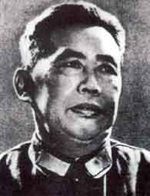Xie Fuzhi
Xie Fuzhi ( Chinese 谢 富 治 , Pinyin Xiè Fùzhì , W.-G. Hsieh Fu-chih ; * 1909 in Hong'an , Hubei ; † March 26, 1972 in Beijing ) was a Chinese general and politician of the Chinese Communist Party (CCP ).
Life
Promotion to Minister for Public Security
Xie, who became a member of the Chinese Communist Party in 1931, was initially a political officer in the fourth column of the 2nd Field Army, whose political commissar Deng Xiaoping was. His unit took part in the Battle of Huaihai against the National Revolutionary Army between November 1948 and January 1949 and then became the 41st Division of the newly formed 4th Army of the 2nd Field Army. Afterwards he was first political commissar of the 4th Army, commanded by General Chen Geng , and at the same time deputy political officer of the 3rd Army, which was under the command of General Chen Xilian .
After the founding of the People's Republic of China on October 1, 1949, he became vice minister for public security and was also the first secretary of the CCP in Yunnan Province from 1952 to 1959 .
In 1955 he was promoted to general and at the 8th Congress of the Communist Party of China in 1956, he became a member of the Central Committee (ZK) of the CCP and the Central Military Commission (ZMK). In September 1959, during the Great Leap, he succeeded Luo Ruiqing as Minister of Public Security and remained ministerial until his death.
Cultural Revolution and Wuhan Incident
In his capacity as Minister of Public Security, he gave a speech during the Cultural Revolution initiated by Mao Zedong in the summer of 1966, which practically allowed the Red Guard to arrest and murder their political opponents, which is in part seen as a trigger for the violence that followed. His early support for the Cultural Revolution led him to become a candidate for the CCP Political Bureau , Secretary of the Central Committee Secretariat, and a member of the reorganized Beijing Party Committee in 1966 . He was also a member of the influential Cultural Revolution group .
After a nationwide formation of new revolutionary committees, starting in Shanghai in 1967 , Xie Fuzhi was elected chairman of the revolutionary committee of Beijing on April 20, 1967 and thus de facto mayor of the city of Beijing . In this capacity, he was also more important than the first secretary of the city's Party Committee, Li Xuefeng , who was ousted shortly afterwards. Xie also succeeded him in the role of First Political Commissioner for the Beijing Military Region.
In July 1967, the commander of the Wuhan military region, General Chen Zaidao, supported the conservative Red Guard with millions of heroes against their militant opponents, the headquarters of the Wuhan workers. After General Chen resisted Prime Minister Zhou Enlai's order not to provide support, Xie Fuzhi and Wang Li were sent to Wuhan to persuade General Chen to comply with the order and thus end the so-called "Wuhan Incident". On July 20, 1967, units of the People's Liberation Army arrested and beat Xie Fuzhi while allowing Wang Li to be detained by the Millions of Heroes faction . Prime Minister Zhou Enlai then flew to Wuhan, but was prevented from landing by a strong military surge from General Chen Zaidao's troops. Immediately thereafter, three infantry divisions and other units were relocated to Wuhan, which shortly thereafter forced General Chen to surrender without further fighting. On July 25, 1967, Xie and Wang returned to Beijing and were received at a mass rally in Tian'anmen Square .
Upon his return to Beijing, he also played a key role in distributing weapons to the Red Guard, such as five hundred rifles to Jinggangshan Commune at Beijing Teachers' University.
At the same time he started an anti-revisionist campaign within the Ministry of Public Security, justifying this with the counter-revolutionary view of his predecessor Luo Ruiqing. His active support of the Cultural Revolution ultimately contributed to the fact that he was on the IX. Became a member of the Politburo at the CCP Congress in April 1969.
In addition, after the re-establishment of the party committees in 1971, he took over the post of First Secretary of the Beijing Party Committee, which had been vacant since Li Xuefeng was ousted in 1967, and held this post until his unexpected death in March 1972.
Xie Fuzhi died before the gang of four around Jiang Qing (Mao Zedong's wife), Zhang Chunqiao , Yao Wenyuan and Wang Hongwen were ousted in 1976. In official documents, however, Xie is considered to be just as responsible for the riots and anti-party riots alongside Kang Sheng Activities during the Cultural Revolution were viewed as such and thus counted as part of the Gang of Four.
In 1980 he was posthumously expelled from the CCP and his urn was removed from the Babaoshan Heroes Cemetery.
Web links
- General - Xie Fuzhi. Ministry of Defense of the PRC, July 31, 2009, archived from the original on August 11, 2014 .
- Xie Fuzhi. In: English People Daily. June 27, 2000(English).
Individual evidence
- ↑ Gong Xiaoxia: The perpetual victims and the momentum of victimization. Persecution of the “Bad Classes” during the Cultural Revolution. In: Asian Research. November 21, 2003, archived from the original on March 9, 2008 ; accessed on August 6, 2019 .
| personal data | |
|---|---|
| SURNAME | Xie, Fuzhi |
| ALTERNATIVE NAMES | 谢 富 治; Xiè, Fùzhì; Hsieh, Fu-chih |
| BRIEF DESCRIPTION | Chinese politician and general |
| DATE OF BIRTH | 1909 |
| PLACE OF BIRTH | Hong'an , Hubei |
| DATE OF DEATH | March 26, 1972 |
| Place of death | Beijing |
